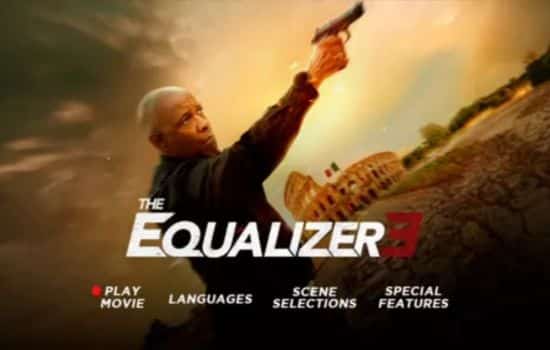Announcements
ÎThe Equalizer 3 fren, known in Latin America as ÚNTel Justiciero: Final Chapter and in Brazil like ÚNO Protector: Final Chapter, is the third installment of the saga starring Denzel Washington and directed by Antoine Fuqua. This action and suspense film closed a trilogy that began in 2014, loosely based on the television series from the 80s ÎThe Equalizer ar.
In this last part, the protagonist Robert McCall faces his past, but he does so in a different environment: instead of the American streets, the story moves to the picturesque but dangerous Italian coast, mixing the beauty of the landscape with brutality. of the local mafia. Unlike the previous ones, this installment has a more contemplative rhythm and a more personal approach.
Synopsis
Announcements
After leaving his life as a government agent behind, Robert McCall (Denzel Washington) attempts to find inner peace and redeem himself for the violent actions of his past. Arriving in a small town in the coastal region of southern Italy, he is warmly welcomed by the locals and begins to live a quiet life.
However, he soon discovers that his new friends are being oppressed by the Italian mafia, specifically the Camorra, one of the most dangerous criminal organizations in the country. Unable to ignore injustice, McCall resumes his role as a silent and lethal vigilante to protect those who cannot defend themselves.
Announcements
As he confronts this criminal network, he also deals with his own inner demons and the possibility of finally leaving violence behind. With the help of Emma Collins (played by Dakota Fanning), a young CIA agent, McCall must face his last great battle.
Main Cast
- Denzel Washington like Robert McCall: A former government agent with a strong sense of justice, now trying to live a quiet life.
- Dakota Fanning like Emma Collins: A CIA analyst who becomes embroiled in conflict due to her connection to McCall.
- David Denman like Frank Conroy: Emma's superior, also linked to operations in Italy.
- Gaia Scodellaro like Aminah: A resident of the town who befriends McCall.
- Remo Girone, Andrea Dodero, and Eugene Mastrandrea they are also part of the cast, representing members of the local community and the mafia.
Criticisms
Specialized criticism received The Equalizer 3 with mixed but generally positive reviews. Many praised Denzel Washington's performance, which brings emotional depth and presence to his character in even quieter scenes. Antoine Fuqua's direction was also recognized for its more refined and leisurely visual style, in contrast to the raw violence characteristic of the previous two installments.
The most praised aspects were:
- Denzel Washington's performance: As always, it offers an intense and nuanced performance.
- The Italian setting: offers a fresh air to the franchise.
- The relationship between McCall and the community: shows a more human side of the character.
However, some critics noted that the slow pace of the film's first half could displease fans who were expecting continued action. It was also criticized that the plot does not provide many surprises and follows a predictable scheme.
Public Reception
Audiences received the film with greater enthusiasm than critics. Many fans of the saga considered it a worthy and emotional ending to Robert McCall's character. Audiences highlighted the protagonist's unique atmosphere, well-executed action scenes, and emotional evolution.
On platforms such as IMDb, Rotten Tomatoes and Metacritic, the film maintained a solid score, standing between 6.5 and 7.5, indicating overall favorable reception. The chemistry between Denzel Washington and Dakota Fanning, who meet again after having worked together on ÎMan on Fire ar (2004), was also well received by the nostalgic public.
At the box office, The Equalizer 3 it performed positively, especially considering its moderate budget. The film grossed more than 180 million dollars worldwide, consolidating the trilogy as one of the most successful within the recent action genre.
Technical and Visual Aspects
Address
In this third installment, Antoine Fuqua achieves a balance between stylized violence and a more introspective approach. Unlike the previous two films, there is a greater emphasis here on silence, observation, and McCall's everyday moments with the Italian community.
Photography
The photography direction, by Robert Richardson (Tarantino's regular collaborator), takes an important visual leap. The light of the Mediterranean, the coastal landscapes, the squares and alleys of the town create a beautiful, almost poetic atmosphere, which contrasts strongly with the violent acts that occur in the shadows.
Music
The soundtrack, composed by Marcelo Zarvos, subtly accompanies McCall's internal transformation. It is not grandiloquent music, but pieces that reinforce suspense, introspection and tension in key moments.
Editing and rhythm
The film opts for a slower editing. During the first half, the atmosphere is built, the secondary characters develop and the threat is established. It is in the second half where the pace accelerates with more intense action sequences and brutal confrontations, characteristic of McCall's style.
Violence and action
Although more contained than in the previous ones, the violence in The Equalizer 3 it's still forceful. McCall acts precisely, lethally and often silently. The action choreographies are carefully executed and continue to convey that sense of cold, relentless justice that defines the character.
Conclusion
ÎThe Equalizer 3 fren it represents a satisfying and emotional closing to Robert McCall's arc. Far from just another action film, this installment delves into the character's psychology, his search for peace, and the way he finds redemption by helping others.
Denzel Washington delivers a solid and compelling performance, while the Italian setting adds an aesthetic and cultural dimension that enriches the narrative. Although it may disappoint those who expected an action-packed film from the first minute, McCall's narrative and emotional evolution justifies the slower, more contemplative approach.
Altogether, the trilogy of The Equalizer he has managed to build an iconic and coherent character, who mixes brutality with humanity. This final chapter says goodbye in style, leaving fans with a sense of closure and reflection.





